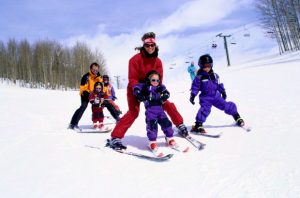
The National Ski Areas Association (NSAA) has compiled a list of safety precautions to review before you hit the slopes to keep yourself safe.
Have the right equipment: Get ski or snowboard bindings properly adjusted at a ski shop. Good equipment can also be rented at resorts.
Wear the right clothes: Choose garments made with high-quality water- and wind-resistant fabric. Look for design features to keep cold air out, including fabric flaps over zippers, fitted cuffs at wrists and ankles, collars that can be cinched up to the chin and adjustable drawstrings.
Dress in layers: Wearing multiple layers allows you to add or remove items if you are too cold or too hot. Choose a bottom layer that dries quickly and absorbs sweat to stay warm. Wear a turtleneck, sweater, and jacket on top.
Expect fickle weather: Carry a hat or headband. Wear gloves or mittens. Be aware of changing conditions. Skiers and snowboarders may speed up on hard or icy slopes.
Use sunscreen: The sun reflects off the snow. It’s important to protect your skin from harmful UV rays — even on cloudy days.
Protect your eyes: Use sunglasses or goggles so you can see potential hazards.
Take a class: Qualified instructors can help you perfect your technique and become a more controlled skier or snowboarder.
Stay focused: It’s important to stay in control mentally as well as physically while on the slopes.
Play it safe: If you end up on a trail that is beyond your ability, remove your skis or snowboard and sidestep down the slope.
Warm up on smaller trails before you begin to take on the larger ones, especially if you’ve been out of the game for quite some time. Lastly, never drink prior to partaking in winter sports, as alcohol can inhibit your reaction time and negatively impact vision, increasing your risk of injury.